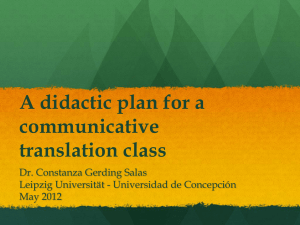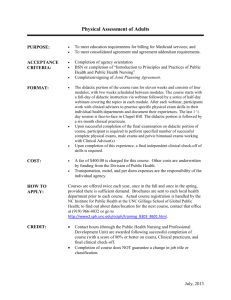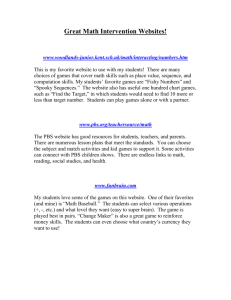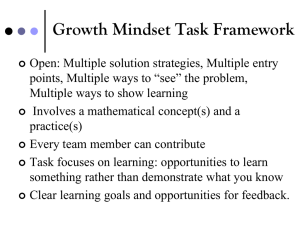- AUCD Home
advertisement
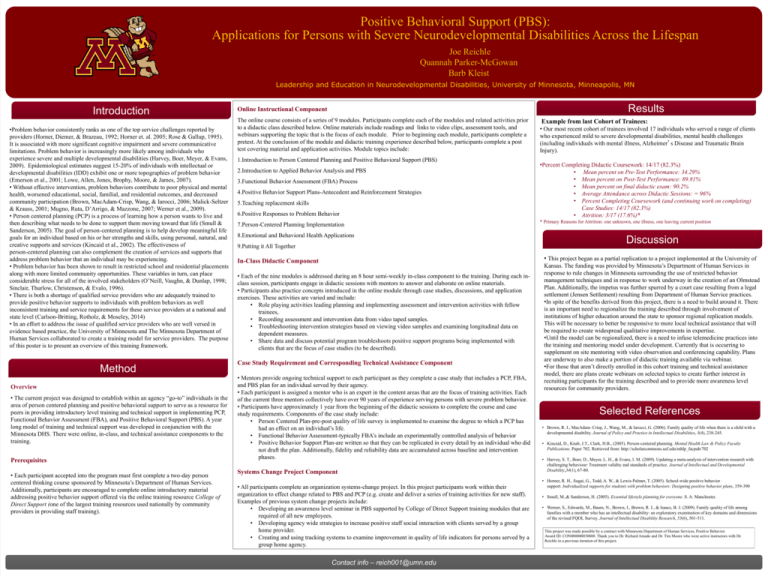
Positive Behavioral Support (PBS): Applications for Persons with Severe Neurodevelopmental Disabilities Across the Lifespan Joe Reichle Quannah Parker-McGowan Barb Kleist Leadership and Education in Neurodevelopmental Disabilities, University of Minnesota, Minneapolis, MN Introduction •Problem behavior consistently ranks as one of the top service challenges reported by providers (Horner, Diemer, & Brazeau, 1992; Horner et. al. 2005; Rose & Gallup, 1995). It is associated with more significant cognitive impairment and severe communicative limitations. Problem behavior is increasingly more likely among individuals who experience severe and multiple developmental disabilities (Harvey, Boer, Meyer, & Evans, 2009). Epidemiological estimates suggest 15-20% of individuals with intellectual or developmental disabilities (IDD) exhibit one or more topographies of problem behavior (Emerson et al., 2001; Lowe, Allen, Jones, Brophy, Moore, & James, 2007). • Without effective intervention, problem behaviors contribute to poor physical and mental health, worsened educational, social, familial, and residential outcomes, and decreased community participation (Brown, MacAdam-Crisp, Wang, & Iarocci, 2006; Malick-Seltzer & Krauss, 2001; Mugno, Ruta, D’Arrigo, & Mazzone, 2007; Werner et al., 2009). • Person centered planning (PCP) is a process of learning how a person wants to live and then describing what needs to be done to support them moving toward that life (Smull & Sanderson, 2005). The goal of person-centered planning is to help develop meaningful life goals for an individual based on his or her strengths and skills, using personal, natural, and creative supports and services (Kincaid et al., 2002). The effectiveness of person-centered planning can also complement the creation of services and supports that address problem behavior that an individual may be experiencing. • Problem behavior has been shown to result in restricted school and residential placements along with more limited community opportunities. These variables in turn, can place considerable stress for all of the involved stakeholders (O’Neill, Vaughn, & Dunlap, 1998; Sinclair, Thurlow, Christenson, & Evalo, 1996). • There is both a shortage of qualified service providers who are adequately trained to provide positive behavior supports to individuals with problem behaviors as well inconsistent training and service requirements for these service providers at a national and state level (Carlson-Britting, Rotholz, & Moseley, 2014) • In an effort to address the issue of qualified service providers who are well versed in evidence based practice, the University of Minnesota and The Minnesota Department of Human Services collaborated to create a training model for service providers. The purpose of this poster is to present an overview of this training framework. Method Overview • The current project was designed to establish within an agency “go-to” individuals in the area of person centered planning and positive behavioral support to serve as a resource for peers in providing introductory level training and technical support in implementing PCP, Functional Behavior Assessment (FBA), and Positive Behavioral Support (PBS). A year long model of training and technical support was developed in conjunction with the Minnesota DHS. There were online, in-class, and technical assistance components to the training. Prerequisites • Each participant accepted into the program must first complete a two-day person centered thinking course sponsored by Minnesota’s Department of Human Services. Additionally, participants are encouraged to complete online introductory material addressing positive behavior support offered via the online training resource College of Direct Support (one of the largest training resources used nationally by community providers in providing staff training). Results Online Instructional Component The online course consists of a series of 9 modules. Participants complete each of the modules and related activities prior to a didactic class described below. Online materials include readings and links to video clips, assessment tools, and webinars supporting the topic that is the focus of each module. Prior to beginning each module, participants complete a pretest. At the conclusion of the module and didactic training experience described below, participants complete a post test covering material and application activities. Module topics include: 1.Introduction to Person Centered Planning and Positive Behavioral Support (PBS) 2.Introduction to Applied Behavior Analysis and PBS 3.Functional Behavior Assessment (FBA) Process 4.Positive Behavior Support Plans-Antecedent and Reinforcement Strategies 5.Teaching replacement skills 6.Positive Responses to Problem Behavior 7.Person-Centered Planning Implementation 8.Emotional and Behavioral Health Applications 9.Putting it All Together Example from last Cohort of Trainees: • Our most recent cohort of trainees involved 17 individuals who served a range of clients who experienced mild to severe developmental disabilities, mental health challenges (including individuals with mental illness, Alzheimer’s Disease and Traumatic Brain Injury). •Percent Completing Didactic Coursework: 14/17 (82.3%) • Mean percent on Pre-Test Performance: 34.29% • Mean percent on Post-Test Performance: 89.81% • Mean percent on final didactic exam: 90.2% • Average Attendance across Didactic Sessions: = 96% • Percent Completing Coursework (and continuing work on completing) Case Studies: 14/17 (82.3%) • Attrition: 3/17 (17.6%)* * Primary Reasons for Attrition: one unknown, one illness, one leaving current position Discussion • This project began as a partial replication to a project implemented at the University of In-Class Didactic Component • Each of the nine modules is addressed during an 8 hour semi-weekly in-class component to the training. During each inclass session, participants engage in didactic sessions with mentors to answer and elaborate on online materials. • Participants also practice concepts introduced in the online module through case studies, discussions, and application exercises. These activities are varied and include: • Role playing activities leading planning and implementing assessment and intervention activities with fellow trainees, • Recording assessment and intervention data from video taped samples. • Troubleshooting intervention strategies based on viewing video samples and examining longitudinal data on dependent measures. • Share data and discuss potential program troubleshoots positive support programs being implemented with clients that are the focus of case studies (to be described). Case Study Requirement and Corresponding Technical Assistance Component • Mentors provide ongoing technical support to each participant as they complete a case study that includes a PCP, FBA, and PBS plan for an individual served by their agency. • Each participant is assigned a mentor who is an expert in the content areas that are the focus of training activities. Each of the current three mentors collectively have over 90 years of experience serving persons with severe problem behavior. • Participants have approximately 1 year from the beginning of the didactic sessions to complete the course and case study requirements. Components of the case study include: • Person Centered Plan-pre-post quality of life survey is implemented to examine the degree to which a PCP has had an effect on an individual’s life. • Functional Behavior Assessment-typically FBA’s include an experimentally controlled analysis of behavior • Positive Behavior Support Plan-are written so that they can be replicated in every detail by an individual who did not draft the plan. Additionally, fidelity and reliability data are accumulated across baseline and intervention phases. Systems Change Project Component • All participants complete an organization systems-change project. In this project participants work within their organization to effect change related to PBS and PCP (e.g. create and deliver a series of training activities for new staff). Examples of previous system change projects include: • Developing an awareness level seminar in PBS supported by College of Direct Support training modules that are required of all new employees. • Developing agency wide strategies to increase positive staff social interaction with clients served by a group home provider. • Creating and using tracking systems to examine improvement in quality of life indicators for persons served by a group home agency. Contact info – reich001@umn.edu Kansas. The funding was provided by Minnesota’s Department of Human Services in response to rule changes in Minnesota surrounding the use of restricted behavior management techniques and in response to work underway in the creation of an Olmstead Plan. Additionally, the impetus was further spurred by a court case resulting from a legal settlement (Jensen Settlement) resulting from Department of Human Service practices. •In spite of the benefits derived from this project, there is a need to build around it. There is an important need to regionalize the training described through involvement of institutions of higher education around the state to sponsor regional replication models. This will be necessary to better be responsive to more local technical assistance that will be required to create widespread qualitative improvements in expertise. •Until the model can be regionalized, there is a need to infuse telemedicine practices into the training and mentoring model under development. Currently that is occurring to supplement on site mentoring with video observation and conferencing capability. Plans are underway to also make a portion of didactic training available via webinar. •For those that aren’t directly enrolled in this cohort training and technical assistance model, there are plans create webinars on selected topics to create further interest in recruiting participants for the training described and to provide more awareness level resources for community providers. Selected References • Brown, R. I., MacAdam–Crisp, J., Wang, M., & Iarocci, G. (2006). Family quality of life when there is a child with a developmental disability. Journal of Policy and Practice in Intellectual Disabilities, 3(4), 238-245. • Kincaid, D., Knab, J.T., Clark, H.B., (2005). Person-centered planning. Mental Health Law & Policy Faculty Publications. Paper 702. Retrieved from: http://scholarcommons.usf.edu/mhlp_facpub/702 • Harvey, S. T., Boer, D., Meyer, L. H., & Evans, I. M. (2009). Updating a meta-analysis of intervention research with challenging behaviour: Treatment validity and standards of practice. Journal of Intellectual and Developmental Disability,34(1), 67-80. • Horner, R. H., Sugai, G., Todd, A. W., & Lewis-Palmer, T. (2005). School-wide positive behavior support. Individualized supports for students with problem behaviors: Designing positive behavior plans, 359-390 • Smull, M.,& Sanderson, H. (2005). Essential lifestyle planning for everyone. S. A: Manchester. • Werner, S., Edwards, M., Baum, N., Brown, I., Brown, R. I., & Isaacs, B. J. (2009). Family quality of life among families with a member who has an intellectual disability: an exploratory examination of key domains and dimensions of the revised FQOL Survey. Journal of Intellectual Disability Research, 53(6), 501-511. This project was made possible by a contract with Minnesota Department of Human Services, Positive Behavior. Award ID: CON000000030800. Thank you to Dr. Richard Amado and Dr. Tim Moore who were active instructors with Dr. Reichle in a previous iteration of this project.
